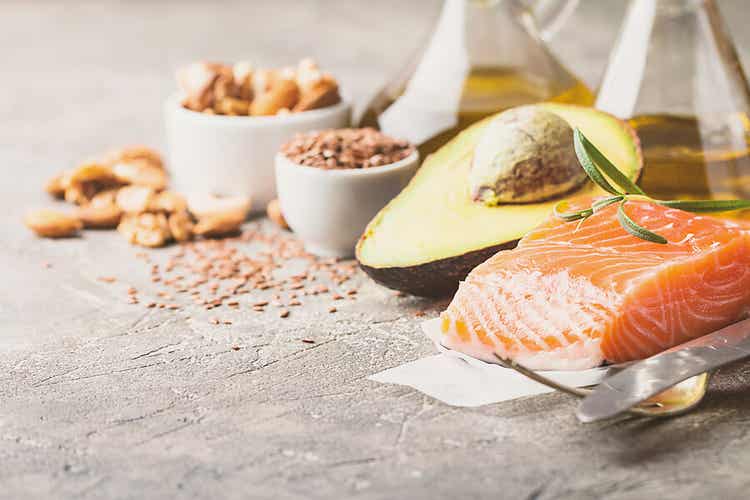Is VLDL Cholesterol Harmful?


Written and verified by the nutritionist Saúl Sánchez Arias
VLDL cholesterol consists of very low-density lipoproteins that can be harmful to health. It’s present in small proportion to total cholesterol, as it constitutes a fraction of LDL cholesterol.
Experts don’t currently classify an increase in the concentration of these lipoproteins as dangerous. However, they do consider their oxidation rate to be a concern. For this reason, it’s crucial to implement a series of strategies aimed at modulating the lipid profile and reducing the rate of oxidation of this lipoprotein.
It’s important to prevent oxidation of VLDL cholesterol
Apparently, as an article in the journal Current Medicinal Chemistry states, oxidation of VLDL could increase the risk of atheroma plaque formation. And this is detrimental and dangerous for cardiovascular health.
To reduce the rate of oxidation of these lipoproteins, making certain dietary changes becomes necessary. The first of these is to increase the consumption of foods from the plant kingdom. Many of these products contain substances with a significant antioxidant nature.
One example is the lycopene in tomatoes. This nutrient reduces the formation of free radicals and also the rate of oxidation of the lipoproteins that make up total cholesterol. We can see this in an article that appeared in the journal Atherosclerosis, which links regular tomato consumption with a reduction in cardiovascular risk.
To know more: 9 Foods to Cleanse Your Arteries Naturally
Certain foods help to modulate lipid profile
At the same time, there are products in the diet that can positively modulate the lipid profile. These foods manage to increase the proportion of HDL cholesterol and reduce that of LDL and VLDL, consequently.
Mono and polyunsaturated fatty acids fulfill this function, which we can find in vegetable oils, oily fish, and nuts, among others.
Other nutrients, such as fiber, are also capable of affecting cholesterol levels. Experts have even associated them with a reduction in cardiovascular risk. One of the hypotheses that exist to support this claim is their ability to positively influence the reduction of VLDL lipoprotein oxidation.

Also, you may be interested in: Fats in Foods: Unsaturated Fats over Saturated or Trans Fats?
Restricting foods to prevent VLDL oxidation
Just as there are foods in the diet that can modulate the lipid profile and reduce the rate of oxidation, there are others that have the opposite effect. This is the case of processed products rich in trans fats and simple sugars.
Trans fats, which originate from subjecting oils to high temperatures, have inflammatory effects and promote oxidation. There are other lipids with inflammatory properties, such as omega-6 fatty acids. However, these are essential in the human diet. You only need to ensure that they’re in balance with omega-3 fatty acids.
Other substances, such as alcohol, help to promote the effects of oxidation and increase cardiovascular risk. For this reason, it’s important to restrict and, if possible, eliminate their consumption. In its place, it’s much better to use sparkling water, for example.

Cholesterol can be harmful
Although total cholesterol has traditionally been linked to cardiovascular risk, we now know that this isn’t the case.
Rather, it’s the oxidation of a small fraction of LDL cholesterol, the VLDL lipoproteins, that may be responsible for the increased risk of atheroma plaque formation.
To minimize this situation, certain dietary strategies are essential. Many of them involve increasing the consumption of vegetables, which contain vitamins and phytonutrients of an antioxidant nature.
At the same time, it’s a good idea to increase the intake of omega-3 fatty acids, since they’re capable of positively modulating the individual’s lipid profile.
Finally, it’s worth highlighting the need to reduce the intake of all the foods that can promote oxidation and inflammatory processes. For example, this includes processed foods, which are rich in trans fatty acids and additives.
To conclude, a healthy diet always prioritizes fresh foods over industrial foods. Another typical case is that of alcohol, as this substance is capable of increasing cardiovascular risk and worsening health-related markers. Therefore, you should avoid it.
All cited sources were thoroughly reviewed by our team to ensure their quality, reliability, currency, and validity. The bibliography of this article was considered reliable and of academic or scientific accuracy.
- Kattoor AJ., Kanuri SH., Mehta JL., Role of Ox LDL and LOX 1 in atherogenesis. Curr Med Chem, 2019. 26 (9): 1693-1700.
- Ming Cheng H., Koutsidis G., Lodge JK., Ashor A., et al., Tomato and lycopene supplementation and cardiovascular risk factors: a systematic review and meta analysis. Atherosclerosis, 2017. 257: 100-108.
- Millán, J., Hernández-Mijares, A., Ascaso, J. F., Blasco, M., Brea, A., Díaz, Á., … & Pintó, X. (2016). La auténtica dimensión del colesterol-no-HDL: colesterol aterogénico. Clínica e Investigación en Arteriosclerosis, 28(6), 265-270.
- Errico T, Chen X, Martin J, Julve J. Mecanismo básicos: estructura, función y metabolismo de las lipoproteínas plasmáticas. Clínica e Investigación en Arteriosclerosis. 2013; 25 (2): 98-103.
This text is provided for informational purposes only and does not replace consultation with a professional. If in doubt, consult your specialist.








